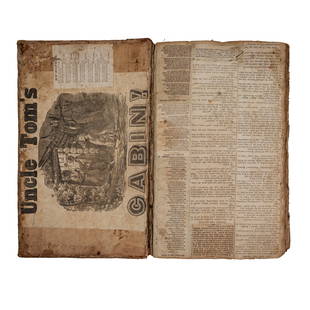
Thomas Paine’s Works in Defense of the French and American Revolutions
Similar Sale History
View More Items in EphemeraRelated Ephemera
More Items in Ephemera
View MoreRecommended Books, Magazines & Papers
View More






Item Details
Description
Thomas Paine’s Works in Defense of the French and American Revolutions
This disbound group of pamphlets written by Thomas Paine includes both parts of his famous Rights of Man, first published in 1791, to refute Edmund Burke’s attack on the French Revolution. It also includes 1792 reprints of his response to Abbé Raynal’s attack on the French-American alliance and his response to critics of the Rights of Man.
THOMAS PAINE, Archive of published pamphlets, 1792, London. 300 pp., 4.25ʺ x 7.5ʺ. Residue of binding on spines; some toning and foxing; very good.
- Rights of Man: Being an Answer to Mr. Burke’s Attack on the French Revolution. London: H. D. Symonds, 1792. iv + 78 pp.
- Rights of Man; Part the Second. Combining Principle and Practice. London: H. D. Symonds, 1792. 94 pp.
- Miscellaneous Articles, by Thomas Paine. London: J. Ridgway, 1792. 36 pp.
- Letter Addressed to the Addressers, on the Late Proclamation. London: H. D. Symonds and Thomas Clio Rickman, 1792. 40 pp.
- Letter Addressed to the Abbe Raynal, on the Affairs of North-America. In Which the Mistakes in the Abbe’s Account of the Revolution in America are Corrected and Cleared Up. London: J. Ridgway, 1792. 48 pp.
Excerpts
“That there are men in all countries who get their living by war, and by keeping up the quarrels of Nations, is as shocking as it is true; but when those who are concerned in the government of a country, make it their study to sow discord, and cultivate prejudices between Nations, it becomes the more unpardonable.” (Rights of Man, Preface, piv)
“Whatever is my right as a man, is also the right of another; and it becomes my duty to guarantee, as well as to possess.” (Rights of Man, p56)
“Independence is my happiness, the world is my country and my religion is to do good.” (Rights of Man, Part the Second, p59)
“And it will hereafter be placed in the history of extraordinary things, that a pamphlet should be produced by an individual, unconnected with any sect or party, and not seeking to make any, and almost a stranger in the land, that should compleatly frighten a whole Government, and that in the midst of its most triumphant security. Such a circumstance cannot fail to prove, that either the pamphlet has irresistible powers, or the Government very extraordinary defects, or both. The nation exhibits no signs of fear at the Rights of Man; why then should the Government, unless the interest of the two are really opposite to each other, and the secret is beginning to be known?” (Letter Addressed to the Addressers, p11)
Historical Background
Thomas Paine, whose pamphlets Common Sense (1776) and The American Crisis (1776-1783) contributed to inspire the American cause in the Revolutionary War, was a very strong supporter of the French Revolution as well. When conservative Edmund Burke attacked the French Revolution in his Reflections on the Revolution in France (1790), Paine responded to Burke’s critique with Rights of Man, which insists that human rights derive from nature, not from any political charter, and he argues that institutions that do not benefit the nation—such as monarchy and aristocracy—are illegitimate. He also proposes practical reformations of the English government, including a written constitution, the elimination of aristocratic titles, a social welfare program, and a progressive income tax.
When the first part of Rights of Man appeared in March 1791, it sold nearly a million copies. When he issued Rights of Man, Part the Second in February 1792, it also sold well and led to the creation of reform societies. The government indicted both Paine and his publisher for seditious libel. Dozens of pamphlets responded to Rights of Man, and Paine responded to many of them from abroad in France. He was tried in absentia, found guilty, and sentenced to death. In the summer of 1792, the year in which these editions were published, Paine responded to the charge of seditious libel: “If, to expose the fraud and imposition of monarchy and every species of hereditary government—to lessen the oppression of taxes—to propose plans for the education of helpless infancy, and the comfortable support of the aged and distressed—to endeavour to conciliate nations to each other—to extirpate the horrid practice of war—to promote universal peace, civilization, and commerce—and to break the chains of political superstition, and raise degraded man to his proper rank;—if these things be libellous, let me live the life of a Libeller, and let the name of LIBELLER be engraven on my tomb.” (Letter Addressed to the Addressers, p20, included here).
In France, Paine was granted honorary French citizenship and elected to the National Convention, despite his inability to speak French. He was even selected as one of nine deputies to be part of the Convention’s Constitutional Committee, charged with drafting a constitution for the French Republic. He supported the Republic but argued against the execution of King Louis XVI. By the end of 1793, he was excluded from the Convention as a foreigner, arrested, and imprisoned. Despite the efforts of Americans in Paris and Paine’s own protests, he remained in prison and narrowly escaped execution. Through the efforts of new American minister James Monroe, Paine was released from prison in November 1794, and in July 1795, readmitted to the Convention.
Thomas Paine (1737-1809) was an English-born intellectual, inventor, and radical pamphleteer who influenced both the American and French Revolutions. He lived and worked in England until 1774, when he migrated to Philadelphia, joining the radical artisan community there. His powerful pamphlet, Common Sense (1776), was the best-selling original work published in eighteenth-century America and had a pronounced impact on the Revolution by making the case for complete independence from Great Britain. He also published a pamphlet series, The American Crisis (thirteen in 1776-1777; three more to 1783), which helped inspire American revolutionaries. General Washington even ordered the first number to be read aloud to his men. Paine later moved to France, published the liberal Enlightenment treatise Rights of Man (1791), and won election to the French National Assembly in 1792. A Girondin, he was arrested in 1793 and narrowly escaped the guillotine during the Reign of Terror. While in prison, he continued to work on The Age of Reason (1794-1807). Paine believed that the American ambassador to France, Federalist Gouverneur Morris, somehow engineered his arrest. Diplomat James Monroe arranged for Paine’s release in November 1794, and Paine turned against George Washington and wrote a scathing public letter to Washington in 1796. Paine remained in France until 1802 when, at President Jefferson’s invitation, he returned to New York.
This item comes with a Certificate from John Reznikoff, a premier authenticator for both major 3rd party authentication services, PSA and JSA (James Spence Authentications), as well as numerous auction houses.
WE PROVIDE IN-HOUSE SHIPPING WORLDWIDE.
Buyer's Premium
- 25%
Thomas Paine’s Works in Defense of the French and American Revolutions
Shipping & Pickup Options
Item located in Wilton, CT, usPayment

Auction Curated By






















![[AMERICAN REVOLUTION] The Boston Chronicle (12) Pre-Revolution Newspapers: Dating mostly from 1768-1769.](https://p1.liveauctioneers.com/4915/314133/168390153_1_x.jpg?height=310&quality=70&version=1703630243)
![[AMERICAN REVOLUTION] Independent Chronicle (Boston) Newspapers: Issues for May 4, 1780 and June 1, 1780, each with Paul Revere 'Appeal to Heaven' woodcuts.](https://p1.liveauctioneers.com/4915/314133/168390151_1_x.jpg?height=310&quality=70&version=1703630243)
![[AMERICAN REVOLUTION] Samuel Osgood Autograph Letter Signed: New York, May 30 1804, to Elishua Jenkins, Comptroller, State of New York. Regarding collections and accounting. Osgood was a minuteman and officer in the Revolution. Appx. 8" x 9 3/4". Good condition](https://p1.liveauctioneers.com/4915/314133/168390150_1_x.jpg?height=310&quality=70&version=1703630243)






















![[EPHEMERA]. Group of Booklets, Magazines, Postcards, Brochu...: [EPHEMERA]. Group of Booklets, Magazines, Postcards, Brochures and Newspaper Clippings Related to Waterloo. [V.p., ca. 19th - 20th century]. Items are in French, English, or German. Some general wear,](https://p1.liveauctioneers.com/928/328184/176813372_1_x.jpg?height=310&quality=70&version=1714496988)
































